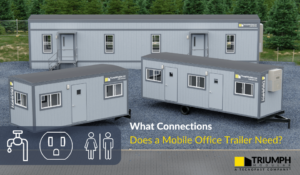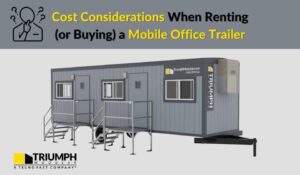Navigating the DOT field office requirements maze can be complicated as each state handles the requirements differently. But what if there was a way to make setting up a DOT field office less complicated? This guide will help you save time searching for the right DOT field office solution.
Key Takeaways
- Understand DOT field office requirements and regulations to ensure compliance.
- Partner with an industry leader like Triumph Modular to guarantee a quality product and first-class customer service.
Understanding DOT Field Office Requirements
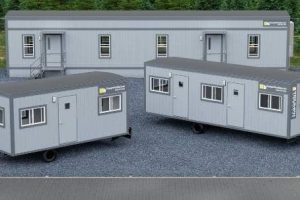
Setting up a DOT field office begins with a comprehensive understanding of office requirements. Regulations differ by state, encompassing specific office types, sizing, utilities, and permits. For example, a state like Connecticut has an extensive list of requirements and regulations for field offices, ranging from sizing requirements to proper data lines, when applicable.
On the other hand, West Virginia has virtually no specific requirements for field offices in highway construction projects.
State-Specific Regulations
Outlining a specific process without looking at your state regulations is difficult. However, most cases start with obtaining a permit for the DOT trailer itself—this prevents any headaches down the road with additional work you’d have to do on-site.
Most states separate field offices into different types: Type A, Type B, Type C, and so on. These types differ slightly from a state like Connecticut, which separates its field office designations by size: Small, medium, large, and extra large.
You’ll also need to consider utilities, such as electricity and plumbing. Every state has different requirements for these scenarios—for example, New Hampshire outlines in their requirements that a 3,000 watt, 115-125 volt AC facility is necessary for every field office or field laboratory. Meanwhile, plumbing and lavatory requirements vary between the different types of offices in New Hampshire—type A offices and field offices have different regulations for lavatory facilities.
In most cases, field office requirements, regulations, and permits for highway construction are handled at the state level—each state’s Department of Transportation website has the information necessary to ensure you’re following the proper rules.
Permit and Regulation Assistance
Following the rhythm of state regulations and permits might seem complex, but with the right partner, it becomes manageable. We handle the complicated process of obtaining the necessary permits and complying with regulations when transporting field offices to a site. You do not have to worry about any of it.
Depending on the road type, size of the field office, and the time of day, additional requirements may be necessary, such as oversized/overweight permits, flag cars, escorts, and police. But don’t worry; we handle everything to ensure a seamless transition from when you sign the lease for your field office to its delivery. We even arrange route surveys when necessary!
Modular Office Solutions for DOT Projects
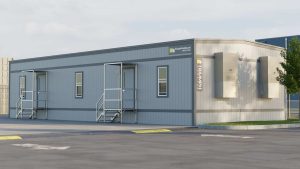
In DOT projects, modular office solutions take the lead with their versatility and efficiency. Modular office solutions provide extensive design flexibility, enabling customization and alteration of spaces in numerous ways.
Customizable and Adaptable Spaces
Mobile offices, depending on their size, are also known as mobile office buildings, and they can be molded to fit specific project requirements, much like clay in a sculptor’s hand. Triumph Modular’s furniture and accessory solutions can be added to your mobile office or modular building.
At Triumph Modular, we are really good at making customized modular field offices just as you need them. We design them to be unique use parts that can change quickly, and pick furniture that can be used in different ways. Our goal is to make these offices fit exactly what you need.
Setting Up a Construction Field Office: Best Practices
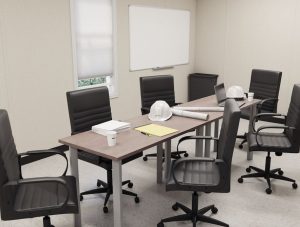
Most states have specific requirements for what goes inside highway construction field offices beyond spatial requirements, such as furnishings, technology, and more.
At Triumph Modular, our modular offerings can provide you with the right-sized field office to meet your needs. We also have The Solutions – furniture and accessory packages that can help you meet the specific requirements of the state that you’re working in.
Some of these furnishing packages include:
- Express Office
- Planning Solution
- Express Bistro
- Business Bistro
- Express Conference
- Business Conference
However, we can’t provide everything. Certain items, such as computers, will need to be acquired separately. If you’re having difficulty finding specific items to meet your state’s requirements, don’t worry. Our local sales representatives are here to help. With their extensive knowledge, they can guide you through the necessary steps and ensure you get the items you need. Contact us today to get started.
Furnishing and Equipping the Office
A construction field office requires suitable furnishing and equipment. Customizable furniture can enable more efficient cost management and adaptability to meet specific requirements.
Partnering with an Industry Leader for Success
Collaborating with industry leaders is often the path to success. For DOT field office implementation, partnering with Triumph Modular ensures comprehensive services and a proven track record.
Comprehensive Services
As an industry leader in modular solutions,our services include:
- Space planning
- Layout design
We offer options to address diverse requirements, encompassing various styles, sizes, and layouts.
Proven Track Record
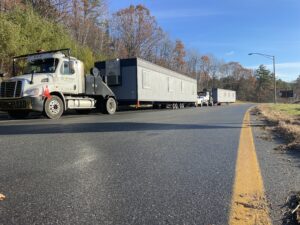
With over 40 years of experience, Triumph Modular has worked with owners, architects, and engineers to elevate the design and performance of temporary and permanent commercial building space. We are a specialty contractor who provides pre-construction assistance, budgeting, project schedule development, and construction management services. We deliver award-winning solutions by continually learning and improving our methods.
A track record in the world of modular construction is measured in:
- On-time project completion
- Cost-effectiveness
- Quality assurance
- Customer satisfaction
- Safety performance
- Productivity
- Regulatory compliance
- Sustainability
- Securing repeat business and referrals
- Sustaining profitability
Addressing Common Concerns and Questions
Clients may have concerns about modular field offices. From the quality and durability of the offices to the transportation and installation process and the maintenance and costs involved, several questions may need answers.
To alleviate these concerns, it’s essential to tackle them directly, providing clear and concise responses. Let’s take a closer look at some of these concerns and questions.
Quality and Durability
Clients depend on the quality and durability of modular field offices. Our offices are built to high-quality standards, ensuring durability and longevity for the project’s duration on various types of buildings and site conditions.
From the use of robust materials like wood frames to rigorous quality testing during construction and diligent maintenance, modular offices are designed to stand the test of time.
Transportation and Installation
Moving a modular field office requires coordination, timing, and adherence to rules. The responsibility for managing this typically falls on the modular construction company, which ensures a seamless and effective process
Each process step is handled with precision and care, from acquiring the required permits to constructing the modular components, obtaining design approval, and assembling the components on location.
Maintenance and Costs
Maintaining a modular field office involves costs. The average maintenance expenses can differ based on the office’s size and the desired options.
From dealing with frozen water lines to roof repairs and regular HVAC upkeep, maintaining a modular field office can have its challenges. However, proper planning and budgeting can effectively manage these challenges.
How Triumph Modular Can Help
We handle the complicated process of obtaining the necessary permits and complying with regulations when transporting field offices to a site. You don’t have to worry about any of it.
Before you dive into the leasing process for your field office trailer, you’ll want to know the specifications for your state – every state has different field office requirements for highway construction projects!
Our ebook, Modular Field Offices For DOT Projects, outlines everything you need to know about field office specs for eleven states – no more internet searches or endless phone calls.
Download our guide today!
Frequently Asked Questions
Do mobile offices come with bathrooms?
Yes. Mobile offices can be ordered with or without a bathroom, depending on availability. If necessary, a bathroom can be modified into a closet.
What optional features are available for the exterior of mobile offices?
Optional features include security screens, door bars, skirting, tie-downs and stairs. Stairs are optional and are not included in the price of the rental.
What is a field office?
A field office is an office of a Federal agency that is not the headquarters location and serves as a staging area for personnel to perform daily operation and maintenance activities.
What are the electrical and plumbing requirements?
8′ wide trailers use a 60 amp service and 110 volts. Ten & 12′ wide trailers use 100 amp service and 220 volts. A multi-sectional trailer’s amperage ranges from 100 to 150 amp service per piece. You will need to check with the local inspector about an Electrical Permit.
Can I winterize my unoccupied modular office buildings?
Yes. Make sure all water lines are drained, the water heater is drained, the breaker is in the “off” position, and antifreeze has been poured into all waste traps. Ensure the module’s open sides have shipping walls in the proper locations. Shipping walls should be constructed with 24″ sheathing strips at the top, bottom, and midpoint. Shipping walls over the axle assembly should have sheathing at full height. Make sure the open side of the building is wrapped with white or clear shipping plastic (minimum six mils). Plywood or paneling strips should be nailed to the shipping walls and unit corners with double-headed nails to secure the plastic. It is also a good idea to run plastic strapping the full length of the unit to assist in keeping the plastic in place.
Shipping plastic should run under the roofing and over the bottom board. This will ensure water will not enter the open floor and attic cavities.
Make sure the hitch and rear end of the unit are supported. This will keep wall covering and siding from cracking and warping. It will also help keep the door and window openings plumb.
Make sure roof drains are open and free of debris. Also, verify that any roof drain piping is stubbed to the unit’s exterior.
Make sure gutters and downspouts are clean and free of debris.
Inspect roof seams, windows, and door caulking. Make any required repairs before the weather arrives so water cannot seep in when the unit is idle.
The roof must be cleared of all heavy snow loads during the winter. Flat roofs will collapse if the snow and ice build up and become too heavy for the trailer.
Are you looking for more information on DOT Field Office trailer specifications?
Before you dive into the leasing process for your field office trailer, you’ll want to know the specifications for your state—every state has different field office requirements for highway construction projects!
Our ebook, Modular Field Offices For DOT Projects, outlines everything you need to know about field office specs for twelve states—no more internet searches or endless phone calls.
Download our Guide today!
Do you have a link to the individual state DOT websites?
To help get you started, here’s a link to some of the DOT websites associated with states in the northeast.
| State | Website |
| Connecticut | Link |
| Maine | Link |
| Massachusetts | Link |
| New Hampshire | Link |
| Ohio | Link |
| Pennsylvania | Link |
| Vermont | Link |
| West Virginia | Link |
| Rhode Island | Link |
| New Jersey | Link |
| Delaware | Link |
| Michigan | Link |
Do mobile offices come with bathrooms?
Yes. Mobile offices can be ordered with or without a bathroom, depending on availability. If necessary, a bathroom can be modified into a closet.
What optional features are available for the exterior of mobile offices?
Optional features include security screens, door bars, skirting, tie-downs and stairs. Stairs are optional and are not included in the price of the rental.
What is a field office?
A field office is an office of a Federal agency that is not the headquarters location and serves as a staging area for personnel to perform daily operation and maintenance activities.
What are the electrical and plumbing requirements?
8′ wide trailers use a 60 amp service and 110 volts. Ten & 12′ wide trailers use 100 amp service and 220 volts. A multi-sectional trailer’s amperage ranges from 100 to 150 amp service per piece. You will need to check with the local inspector about an Electrical Permit.
Can I winterize my unoccupied modular office buildings?
Yes. Make sure all water lines are drained, the water heater is drained, the breaker is in the “off” position, and antifreeze has been poured into all waste traps. Ensure the module’s open sides have shipping walls in the proper locations. Shipping walls should be constructed with 24″ sheathing strips at the top, bottom, and midpoint. Shipping walls over the axle assembly should have sheathing at full height. Make sure the open side of the building is wrapped with white or clear shipping plastic (minimum six mils). Plywood or paneling strips should be nailed to the shipping walls and unit corners with double-headed nails to secure the plastic. It is also a good idea to run plastic strapping the full length of the unit to assist in keeping the plastic in place.
Shipping plastic should run under the roofing and over the bottom board. This will ensure water will not enter the open floor and attic cavities.
Make sure the hitch and rear end of the unit are supported. This will keep wall covering and siding from cracking and warping. It will also help keep the door and window openings plumb.
Make sure roof drains are open and free of debris. Also, verify that any roof drain piping is stubbed to the unit’s exterior.
Make sure gutters and downspouts are clean and free of debris.
Inspect roof seams, windows, and door caulking. Make any required repairs before the weather arrives so water cannot seep in when the unit is idle.
The roof must be cleared of all heavy snow loads during the winter. Flat roofs will collapse if the snow and ice build up and become too heavy for the trailer.
Are you looking for more information on DOT Field Office trailer specifications?
Before you dive into the leasing process for your field office trailer, you’ll want to know the specifications for your state—every state has different field office requirements for highway construction projects!
Our ebook, Modular Field Offices For DOT Projects, outlines everything you need to know about field office specs for twelve states—no more internet searches or endless phone calls.
Download our Guide today!


